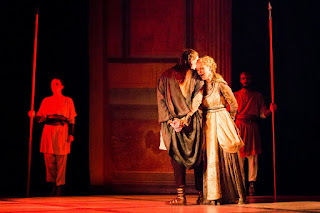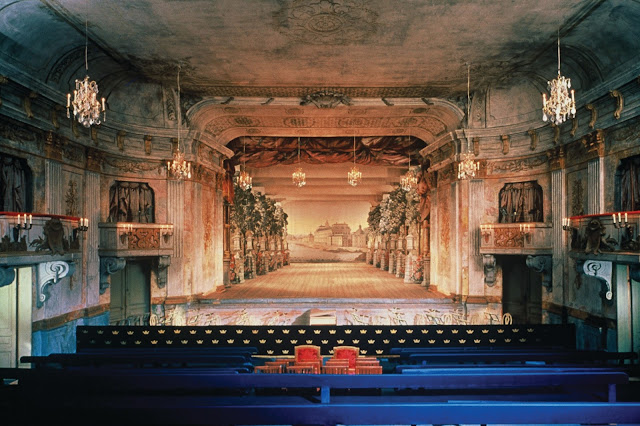 |
| Ian Page and Classical Opera |
The idea of a Mozart festival lasting 25 years, exploring the composer's work year by year, arose out of Ian's love of contextualising things, of telling a story through programming. He is fascinated by the associations between works and feels that in the larger context of the festival with more works being performed, things really resonate. So when they performed JC Bach's Adriano in Siria last year (which premiered in London in 1765 whilst Mozart was there), or perform Jommelli's Il Vologeso (which premiered in 1766) then it enables Ian and his performers to look sideways at Mozart's own music, and he feels that it takes them on a journey. Not everything they perform will have been heard by Mozart (there is no record of him hearing Il Vologeso but he met Jommelli in 1763), but what the festival does is give listeners a taste of the music that was around, the sometimes surprising ideas that were in the air. Later on in our conversation we comment on the music of Franz Ignaz Beck whose symphony Ian and his ensemble performed at the Wigmore Hall in the 1766: A Retrospective concert, a work that was almost Beethovenian 34 years before Beethoven's first symphony.
'beautiful but old-fashioned'
 |
| Johann Christian Bach - Adriano in Siria - Classical Opera Ellie Laugharne and Erica Eloff |
Ian was struck at how well Jommelli wrote the accompanied recitatives in Il Vologeso, finding some visceral, so he was rather on the look out for an excuse to perform it, and the sample we heard at the 1766: A Retrospective concert suggests that we are in for a treat. Jommelli's Il Vologeso isn't neglected masterpiece; for Ian it is worth putting not only because it is interesting in its own right but also for what we can learn about the musical landscape of the time.
Works like Jommelli's operas, and those of Haydn, which were written for private performances at court or at a nobleman's house would play to a relatively closed group of listeners, but we have to assume that the aristocrats who heard the music talked about it, giving the composers something of a reputation in the outside world.
Classical Opera will be performing Haydn's La Cantarina in September 2016 at the Wigmore Hall and at Schloss Esterhazy in Eisenstadt, and Ian hopes to perform most of Haydn's operas during the festival. He heard Haydn's Orlando Paladino at the Drottningholm Festival and it was an eye-opener for him. Admittedly the opera is dramatically weaker than Mozart's operas, but beautifully crafted. And having performed JC Bach's Adriano in Siria, Ian would like to explore more of JC Bach's music
links and resonances... instructive on so many levels
 |
| Ian Page and Classical Opera |
Last year they had a weekend event which explored the music which Mozart wrote whilst he was in London in 1765 with five concerts in Milton Court concert hall. Ian was able to explore the music performed at the time because there is a good record of all the operas performed in London, and at the time many had selections of the most famous arias published. So he was able to have concerts performing selections from the English operas, the Italian operas, and the Bach/Abel concert series which were performed during Mozart's visit, along with an exploration of Mozart's Chelsea notebook. There was music by composers like George Rush, who Ian had never heard of before. And an English soprano aria which evoked the duet for Susanna and Figaro from Le nozze di Figaro which Mozart wrote 21 years later. Ian speculates that the aria stuck in the young composer's mind, to be recycled all those years later.
And during 1766, whilst he was in the Hague, Mozart wrote three concert arias (two of which were performed at the 1766: A Retrospective concert) and chose to set texts from Artaserse. Ian thinks it can be no co-incidence that one of the operas Mozart heard in London the year before was Thomas Arne's Artaxerxes. This demonstrates the sort of links and resonances that Ian feels the festival can throw up, proving really interesting and instructive on so many levels.
the beauty of Drottningholm Castle Theatre
 |
| Drottningholms Slottsteater - photo Bengt Wanselius |
For Ian the beauty of Drottningholm Castle Theatre in period operas is that everything just works. For a start the orchestra is placed virtually dead centre longitudinally in the space, so hearing is optimal, and such theatres were technically sophisticated, even if everything was manual. Some years ago Ian led a tour of Drottningholm Castle Theatre and for those on the tour, the abiding memory was not the music performed but the magic created by the almost instant scene changes. Of course the auditoriums of Baroque theatre could be very ornate and Ian wondered how a set designer copes with the competition from an elaborate auditorium like that in the 18th century theatre in Bayreuth.
 |
| Margravial Opera House, Bayreuth © Bavarian Department for State-owned Palaces, Gardens and Lakes (BSV) photo: Heiko Oehme |
With some of the Mozart operas such as his serenata Il sogno di Scipione, it is not possible to tell from Mozart's letters whether the performance was staged or not. It was premiered in a small-ish space in Salzburg so may not have been fully staged, but this did not seem to matter to contemporaries. And of course, stage costume was simply a variant of ordinary court dress so both audience and cast would look similar.
Part two of my interview with Ian Page follows next week, when we discuss the importance of rehearsing recitative, the problem of which edition to perform and Classical Opera's work outside Mozart 250.
Ian Page and Classical Opera - forthcoming performances
Jommelli - Il Vologeso, 28 April 2016, Cadogan Hall
Ann Hallenberg, Che puro ciel - 23 May 2016,
Mozart - Don Giovanni, 17 June 2016, Cadogan Hall
Haydn - La Canterina, 19 September 2016, Wigmore Hall
Recent Recordings
Mozart - Il re pastore
Mozart - Mitridate, re di Ponto
Mozart - Apollo e Hycinthus
The A-Z of Mozart Opera
Mozart - Die Schuldigkeit des erstens Gebots
Blessed Spirit - A Gluck retrospective
Elsewhere on this blog:
- Le choeur chant du coeur: Tenebrae & Nigel Short in French choral music - concert review
- Clarity, tone and words: Ben Johnson in English song - CD review
- Impressive debut: Suzi Rigby and ORA Singers - concert review
- Bach with finesse: Peter Hill in Bach's French suites - CD review
- Italian sunshine & Mozartean perfection: Nash Ensemble at the Wigmore Hall - concert review
- Modified rapture: Chabrier's L'Etoile at Covent Garden - opera review
- Vividly engaging: Vilde Frang, Arcangelo & Jonathan Cohen in Mozart violin concertos - concert review
- Conductors are megalomaniacs! My encounter with Jonathan Lowe - interview
- Powerful and thoughtful: Jonathan Plowright at Rhinegold Live - concert review
- Classical music hyper production conference: my report - conference report
- Gripping theatre: Stuart MacRae and Louise Walsh's The Devil Inside - opera review
- Home











No comments:
Post a Comment